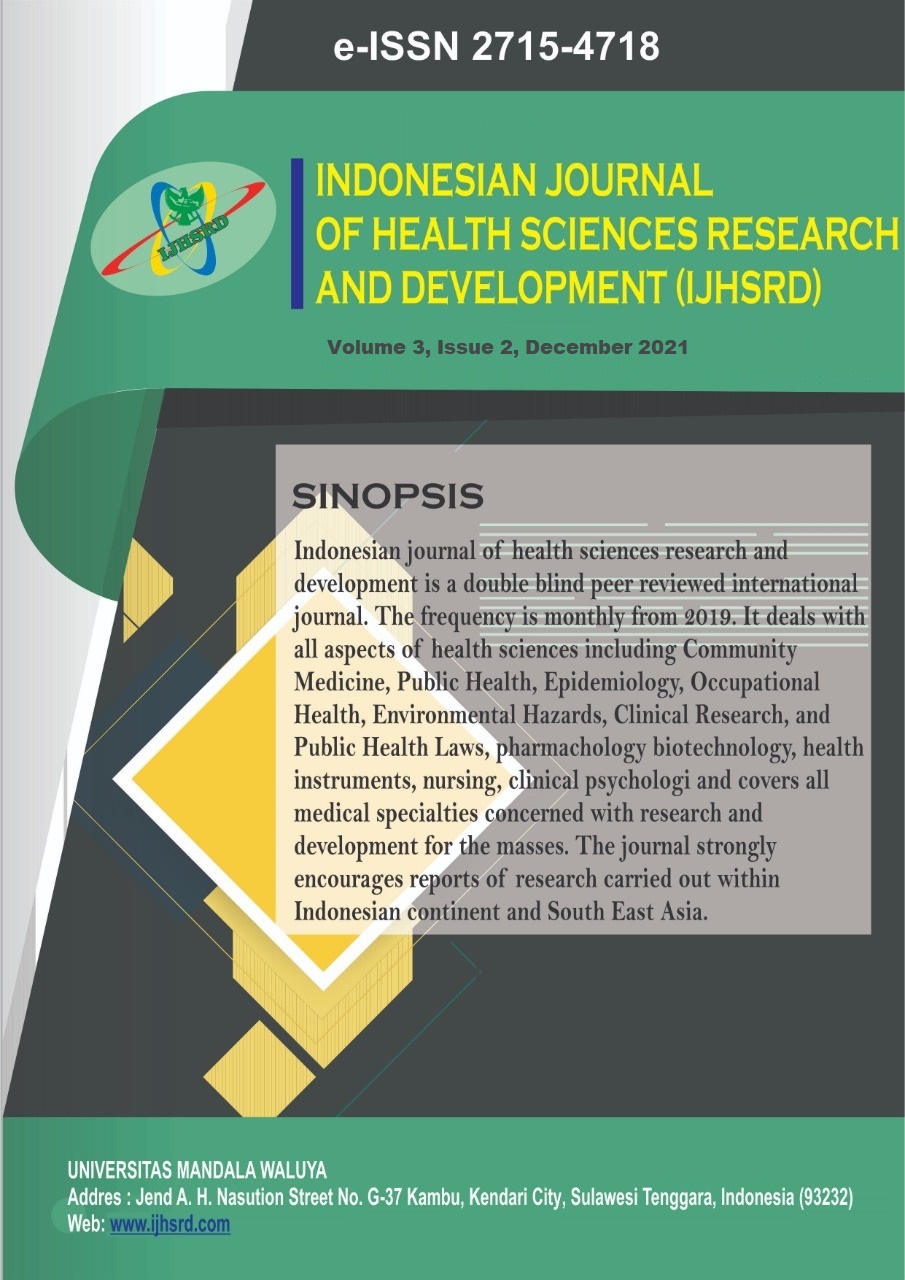Main Article Content
Abstract
Background: A preliminary survey conducted by interviewing 10 (ten) pregnant women at Kendari City Health Center found that as many as 6 (six) people did a pregnancy check but did not take the human immunodeficiency test at the health centre on the grounds that the mother could not be infected with HIV and AIDS because they have sexual relations only with their husbands and 4 (four) pregnant women take an HIV test because it is recommended by the midwife to do an HIV test. HIV.
Methods: This quantitative research used cross sectional study design. The population is 703 pregnant women, with the determination of the sample usingLemeshow formula so that the number of samples is 85 pregnant women.
Result: Statistical test showed that the value (X2hits)= 12,117 > X2tabs=3,841, for the relationship between husband's support and examination of human immunodeficiency virus in pregnant women and (X2hits)= 14,859> X2tabs=3,841, for the relationship between the support of health workers and the examination of human immunodeficiency virus in pregnant women in the Kendari City Health Center Work Area.
Conclusion: There is a relationship between husband's support and health workers with examination of human immunodeficiency virus in pregnant women in the Kendari City Health Center Working Area
Keywords
Article Details

This work is licensed under a Creative Commons Attribution-ShareAlike 4.0 International License.
References
- Organizations WH. World Health Organization model list of essential medicines: 21st list 2019. World Health Organization, 2019.
- Southeast Sulawesi Provincial Health Office. Data for the Human Immunodeficiency Virus Test for Pregnant Women in Kendari: Southeast Sulawesi; 2020.
- Milayanti W. Factors Relating to Pregnant Women's Efforts in Preventing Mother-to-Child HIV Transmission in the Work Area of the New Jumpandang Health Center, Makassar City. Macassar: Faculty of Public Health, Hasanuddin University. 2018.
- ADOLF LL. Journal Analysis of Family Support, Support of Health Workers, and Behavior of HIV Mothers in Prevention of Transmission of HIV or Aids to Babies. 2019.
- Nelwan JE. Reproductive Health Epidemiology: Depublish; 2019.
- Notoadmojo S. Public Health Rineka Cipta. Jakarta; 2014.
- Notoadmojo S. Introduction to Health Education and Research. Yogyakarta Andi Offset. 2007.
- Halim Y, Syamsulhuda B, Kusumawati A. Factors Associated with Behavior of Pregnant Women in HIV Examination in the Work Area of the Halmahera Health Center Semarang City. Journal of Public Health (Undip). 2016;4(5):395-405.
- Priyoto W. Basic Patient Safety Needs. Graha Ilmu Yogyakarta. 2014.
- Yawandare Y. Relationship between Family Support and Anxiety Levels in Preoperative Patients at Level III Hospital of Kodam V Brawijaya Surabaya: Merdeka University Surabaya; 2019.
- Chiani SH, Windari AP. Support of Health Workers on HIV Testing Behavior in Pregnant Women. Hasanuddin Journal of Midwifery. 2021;3(1):67-72.
- Fauziani F, Nadapdap T, Safitri ME. Factors Affecting Pregnant Women in Hiv Examination at Idi Rayeuk Health Center, East Aceh Regency in 2020. Journal of Healthcare Technology And Medicine. 2021;7(1):352-63.
